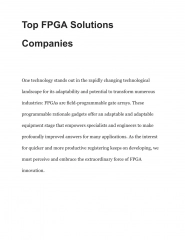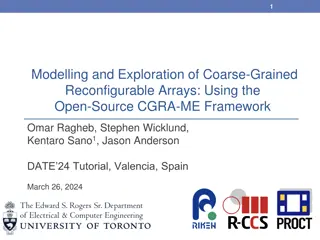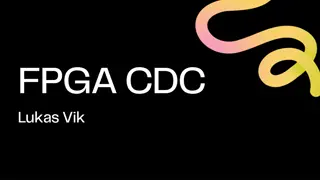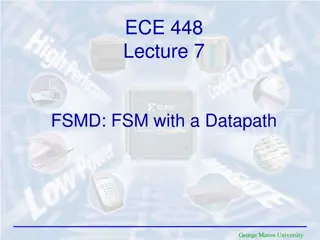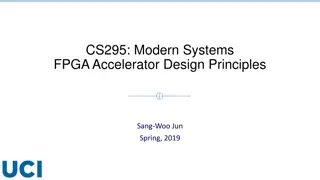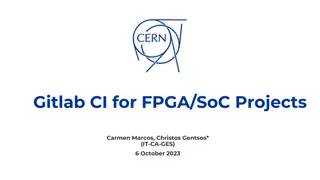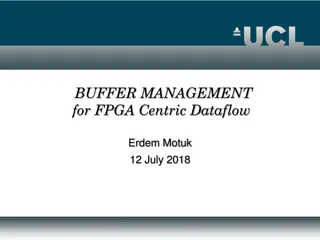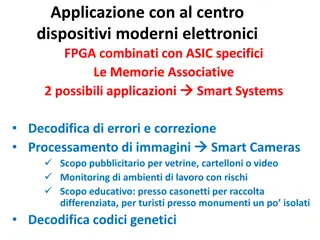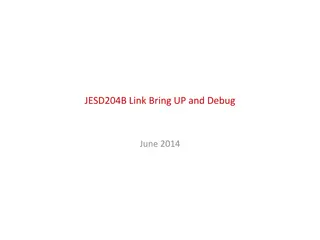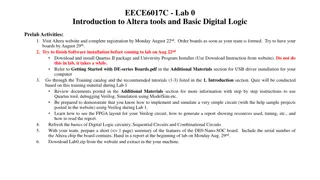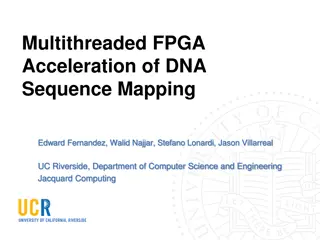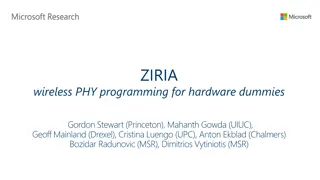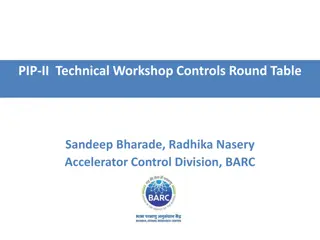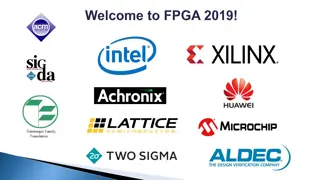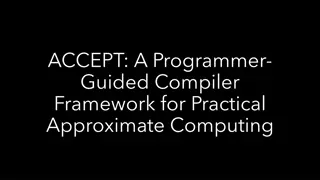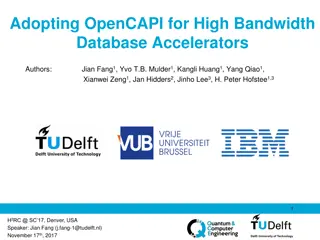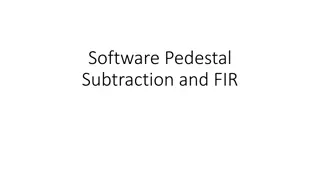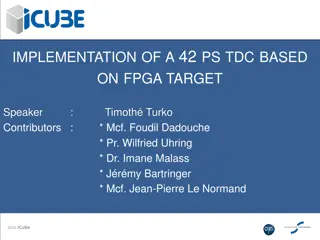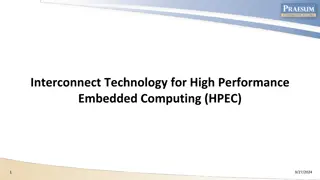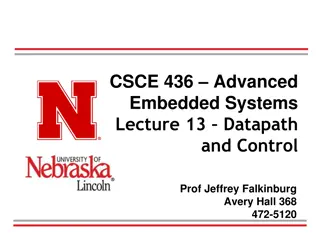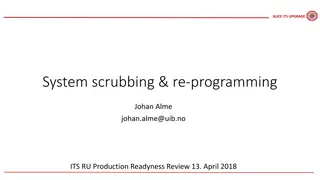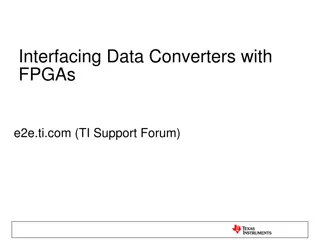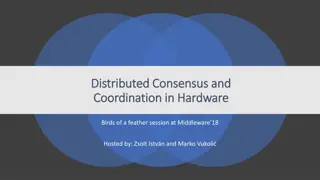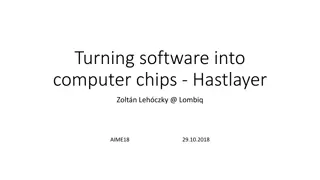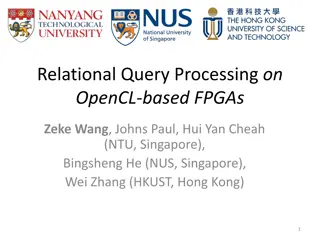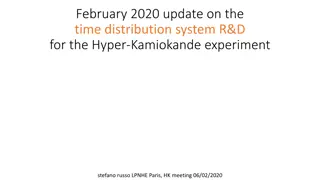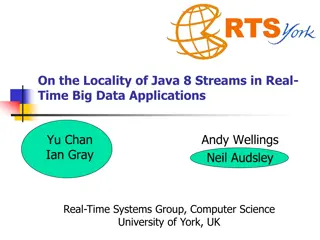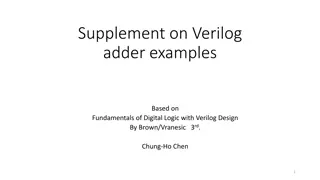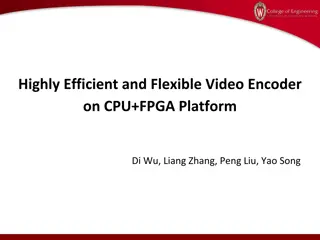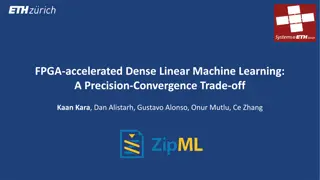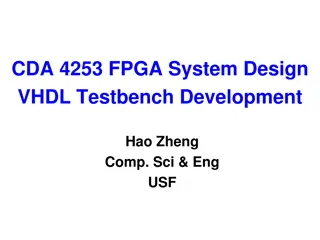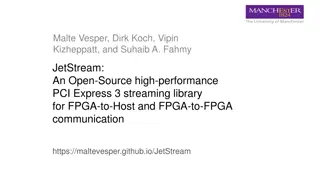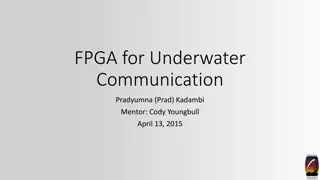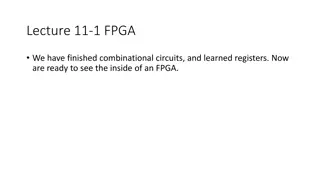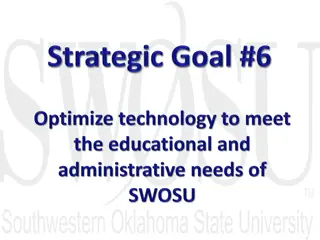Top FPGA Solutions Companies
In the rapidly evolving technological landscape, one technology stands out for its versatility and potential to revolutionize various industries: Field-Programmable Gate Arrays (FPGAs). These programmable logic devices offer a flexible and customizable hardware platform that enables engineers and de
1 views • 1 slides
Exploring GNU Software Radio: A Comprehensive Overview
Delve into the world of GNU Software Radio with Thanh Le and Lanchao Liu as they discuss the hardware, software, and communication aspects of this technology. Learn about USRP solutions, hardware capabilities, available daughter-boards, and explore the software-defined radio user applications. The b
4 views • 43 slides
Modelling and Exploration of Coarse-Grained Reconfigurable Arrays Using CGRA-ME Framework
This content discusses the CGRA-ME framework for modelling and exploration of Coarse-Grained Reconfigurable Arrays (CGRA). It covers the objectives, architecture description, inputs required, and tools included in the framework. CGRA-ME allows architects to model different CGRA architectures, map ap
2 views • 33 slides
Advanced FPGA Design: Ensuring Safety, Reliability, and Predictability
With a background in MSc Applied Physics and 10 years of experience in FPGA development, the focus is on verifying asynchronous and analog aspects of FPGA design for safe, reliable, and robust performance. Limited resources and articles drive the need to collaborate for knowledge sharing and explori
0 views • 18 slides
Understanding FSMD: FSM with Datapath in FPGA Design
Explore the concept of Finite State Machine with Datapath (FSMD) in FPGA design, as discussed in the lecture at George Mason University. Learn about translating sequential algorithms into hardware, using registers and control paths to simulate variables, and realizing systems through RTL design. Dis
3 views • 54 slides
FPGA Accelerator Design Principles and Performance Snapshot
This content explores the principles behind FPGA accelerator design, highlighting the extreme pipelining via systolic arrays that enables FPGAs to achieve high speeds despite lower clock frequencies compared to CPUs and GPUs. It delves into the application of Flynn's Taxonomy, performance snapshots
0 views • 17 slides
Enhancing FPGA/SoC Projects with Gitlab CI: A Comprehensive Overview
Exploring the significance of Continuous Integration (CI) in FPGA/SoC projects, this presentation delves into the basics of Gitlab CI, defining CI jobs, the benefits of CI practices, project objectives, and the future plans for supporting over 100 users. The focus is on creating a scalable, VM-based
0 views • 13 slides
FPGA Centric Dataflow Buffer Management Overview
This overview discusses buffer management for FPGA-centric dataflow systems, including the use of DDR4 RAM, solid-state storage, FIFO structures, and trigger commands for efficient data processing and storage. It also covers the handling of compressed and uncompressed data volumes, proposed hardware
0 views • 12 slides
Innovative Applications of Associative Memory in Modern Electronic Devices
Explore the diverse applications of combining FPGA with specific ASICs and associative memories in smart systems, error decoding, image processing, advertising displays, and workplace monitoring. Learn about Content Addressable Memory (CAM) utilization, pattern matching techniques, and real-life exa
0 views • 18 slides
Understanding and Debugging JESD204B: Practical Guide
This guide provides a comprehensive overview of understanding and debugging JESD204B interfaces. From achieving CGS and ILAS phases to troubleshooting user data alignment issues, it covers essential steps and tips for successful implementation and debugging. The content includes an introduction to t
0 views • 32 slides
Altera Tools & Basic Digital Logic Lab Prep Activities
In preparation for the lab, tasks include registering on the Altera website, ordering required boards, installing software, familiarizing with DE0-Nano-SOC board, exploring digital logic concepts, and practicing Verilog circuits like half adder, full adder, D Flip Flop. The activities involve downlo
0 views • 13 slides
FPGA Acceleration of DNA Sequence Mapping using Multithreaded Architectures
Introduction to the use of FPGA for hardware acceleration of multithreaded architectures targeting DNA sequence mapping, implementation of FHAST tool, FM-Index string matching algorithm, and evaluation of results.
0 views • 20 slides
Enhancing Wireless Programming Tools for Improved Development Efficiency
The article discusses the challenges faced by wireless researchers in current programming tools, highlighting issues with CPU and FPGA platforms. It explores the need for better tools to address manual optimizations, code portability, and innovation hurdles in wireless programming for modern technol
0 views • 49 slides
Innovations in Wireless PHY Programming for Hardware
Programming software radios is a key aspect of wireless communication research, with recent advancements in PHY/MAC design and the use of SDR platforms like GNURadio and SORA for experimentation. Challenges include FPGA limitations and the need for hardware synthesis platforms like ZIRIA for high-le
0 views • 41 slides
Advanced Controls and Systems Development in Accelerator Technology
Explore the cutting-edge technologies and extensive experience in system development within the Accelerator Control Division at BARC. The workshop covers a range of topics including SoC-FPGA system architecture, GUI development for RF control, EPICS application development, and lessons learned in im
0 views • 15 slides
Enhancing Workforce Development in Electronics for High Energy Physics (HEP)
Addressing the challenge of finding expertise in electronics, particularly in digital logic development for FPGA and ASIC, this initiative focuses on creating tools, structures, codebases, and educational programs to efficiently train the next generation. The aim is to improve local training efforts
0 views • 6 slides
Exploring the Latest Trends in FPGA Technology and Applications
The ACM International Symposium on FPGAs brought together industry leaders and academia to discuss the rapid growth of FPGA technology in fields like machine learning, circuit design, and computing architectures. With insightful sessions, keynotes, and panels, the symposium highlighted the increased
0 views • 13 slides
ACCEPT: A Programmer-Guided Compiler Framework for Practical Approximate Computing
ACCEPT is an Approximate C Compiler framework that allows programmers to designate which parts of the code can be approximated for energy and performance trade-offs. It automatically determines the best approximation parameters, identifies safe approximation areas, and can utilize FPGA for hardware
0 views • 15 slides
Enhancing Database Accelerators with OpenCAPI Technology
Explore how OpenCAPI is revolutionizing database accelerators by enabling high bandwidth connections, improving data movement speeds, reducing latency, and enhancing memory scalability. The adoption of OpenCAPI in conjunction with FPGA technology promises significant performance boosts for computati
0 views • 13 slides
Overview of Front-End DAQ for TREND
Cutting-edge Front-End DAQ system featuring components like the Texas Instruments ADS6424 ADC, ALTERA 5CEFA4F23C6N FPGA, Ring Buffer for data management, u-blox Precision Timing GPS module for accurate time stamping, and General Slow Control Architecture for monitoring. The system utilizes Ethernet
0 views • 15 slides
Pedestal Subtraction and FIR Technique Implementation in FPGA
The content discusses the implementation of the Pedestal Subtraction and Finite Impulse Response (FIR) techniques in FPGA for processing ADC counts from a single channel. It details the update rules for pedestal values during hit detection, considerations for FIR tap values, and the process of new A
0 views • 5 slides
FPGA Data Ingest Processing for NARA Electronic Records
NARA's Innovative Systems Lab at the University of Illinois is exploring FPGA technology for electronic records management. The project aims to address challenges in data storage, retrieval, and integrity for long-term archival. FPGAs offer software-configurable chips with unique capabilities for on
0 views • 76 slides
Implementation of a 42-PS TDC Based on FPGA Target
Context: Time-to-Digital Converter (TDC) architecture, methodology, and realization for high-throughput time-correlated single-photon counting in microfluidic droplets. Fluorescence Lifetime (FL) measurements offer high system sensitivity and accuracy. TDC specification for FPGA target with temporal
0 views • 21 slides
Cutting-Edge Interconnect Technology for High-Performance Computing
Explore the world of high-performance embedded computing through images and descriptions detailing key components like terrestrial autonomous vehicles, wireless infrastructure, FPGA-based data exchange, and more. The content dives into fault tolerance, data processing, redundant computing, and hardw
0 views • 12 slides
Understanding BRAM in Advanced Embedded Systems
Explore the concept of Block RAM (BRAM) in advanced embedded systems, focusing on its configuration options, usage in FPGA devices, and capabilities for storing large amounts of data. Learn about BRAM types, synchronous operations, and the design complexities involved in utilizing BRAM efficiently f
0 views • 21 slides
Overview of ALICE ITS UPGRADE System Scrubbing and FPGA Programming
ALICE ITS UPGRADE system undergoes scrubbing for error correction using various techniques like Xilinx Soft Error Mitigation Core and External Scrubbing Network. The FPGA programming overview includes standard operations, remote updating methods, and FPGA versions timeline. Relevant topics cover dat
0 views • 19 slides
FPGA Data Converter Interfacing Overview
Explore various I/O formats for interfacing data converters with FPGAs, including ADC parallel and serial formats like CMOS, LVDS, DDR. Learn about clock edge alignment, parallel, and true serial formats. Understand the differences between SDR and DDR, as well as considerations for clocking and data
0 views • 32 slides
Distributed Consensus and Coordination in Hardware Birds of a Feather Session
Specialists in distributed consensus and hardware coordination gathered at Middleware 18 for a session hosted by Zsolt István and Marko Vukoli. The session covered topics such as specialized hardware, programmable switches and NICs, P4 language for expressing forwarding rules, and deployment exampl
0 views • 33 slides
Unleashing the Power of FPGAs: Hastlayer Transformation
Explore the innovative concept of turning software into computer chips through Hastlayer, a cutting-edge technology that enables logic to be expressed in both software and hardware. Discover the benefits of using Field-Programmable Gate Arrays (FPGAs) for parallel compute-bound algorithms, achieving
0 views • 19 slides
Relational Query Processing on OpenCL-based FPGAs
This study explores the efficient processing of relational queries on FPGA hardware using OpenCL, a programming language for heterogeneous computing environments. The evolution of FPGA architectures, optimization methods for OpenCL, and the benefits of kernel vectorization and compute units are disc
0 views • 38 slides
Time Distribution System R&D Update for Hyper-Kamiokande Experiment
In the February 2020 update, Stefano Russo from LPNHE Paris presented the progress on the time distribution system R&D for the Hyper-Kamiokande experiment. The focus is on implementing a bidirectional data exchange link with a large bandwidth capacity for synchronous, phase-deterministic protocol. T
0 views • 17 slides
Locality of Java 8 Streams in Real-Time Big Data Applications
The study explores the impact of ccNUMA and locality on Java 8 Streams, focusing on their complexity and implementation in real-time Big Data applications. It discusses the Java support for server computers in clusters, the use of streams for programming models, and considerations for extending stre
0 views • 22 slides
Verilog Adder Examples & Typical IC Design Flow
This comprehensive content delves into Verilog adder examples, typical IC design flow, physical design considerations, and examples of OpenGL ES GPU and ARM hypervisor applications. It covers the fundamentals of digital logic with Verilog design, hardware description language, FPGA prototyping, phys
0 views • 27 slides
Efficient Video Encoder on CPU+FPGA Platform
Explore the integration of CPU and FPGA for a highly efficient and flexible video encoder. Learn about the motivation, industry trends, discussions, Xilinx Zynq architecture, design process, H.264 baseline profile, and more to achieve high throughput, low power consumption, and easy upgrading.
0 views • 27 slides
Efficient Training of Dense Linear Models on FPGA with Low-Precision Data
Training dense linear models on FPGA with low-precision data offers increased hardware efficiency while maintaining statistical efficiency. This approach leverages stochastic rounding and multivariate trade-offs to optimize performance in machine learning tasks, particularly using Stochastic Gradien
0 views • 26 slides
Testbench Development in FPGA System Design Using VHDL: An Overview
Testbenches play a crucial role in FPGA system design using VHDL by allowing for systematic testing of digital circuits. They facilitate the application of stimuli to the Design Under Test (DUT) and verification of expected outputs. This overview covers the basic processes involved in testbench deve
0 views • 40 slides
Overview of JetStream: A High-Performance PCIe Streaming Library for FPGA Communication
JetStream is an open-source PCIe streaming library developed for efficient FPGA-to-Host and FPGA-to-FPGA communication. It implements key OSI layers, handles physical and data link layers, and provides mechanisms for chunk transfers and managing outstanding requests. JetStream offers superior perfor
0 views • 23 slides
FPGA for Underwater Communication Project Overview
This project, led by Pradyumna (Prad) Kadambi with mentor Cody Youngbull, aims to develop a robust high-speed underwater communication system using Field Programmable Gate Arrays (FPGA). The project addresses the slow and cumbersome nature of current underwater communication methods, with a focus on
0 views • 9 slides
Understanding the Inner Workings of FPGA and Complex Programming Logic Devices
Delve into the inner mechanisms of Field Programmable Gate Arrays (FPGA) and Complex Programming Logic Devices, examining components such as configurable logic blocks, lookup tables, function generators, multiplexers, and flip-flops. Explore the application of Shannon's Expansion Theorem in circuit
0 views • 10 slides
SWOSU Technology Optimization Plan
This plan outlines strategic initiatives aimed at optimizing technology to meet the educational and administrative needs of SWOSU. Key focus areas include upgrading identified computers, enhancing technology staffing and support, improving data mining and learning analytics, ensuring satisfaction wi
0 views • 15 slides
